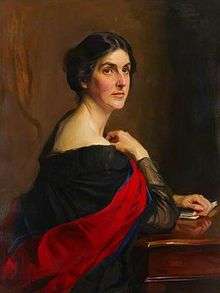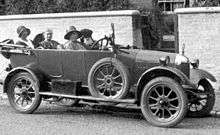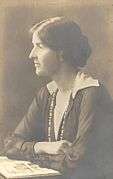Bertha Phillpotts
Dame Bertha Surtees Phillpotts (1877–1932) was an English scholar in Scandinavian languages, literature, history, archaeology and anthropology.
Dame Bertha Phillpotts | |
|---|---|
 | |
| Born | 25 October 1877 Bedford |
| Died | 20 January 1932 Cambridge |
| Nationality | English |
| Academic background | |
| Alma mater | Girton College, Cambridge |
| Academic work | |
| Institutions | Girton College, British Legation, Stockholm, Westfield College |
Biography
Bertha Phillpotts was born in Bedford on 25 October 1877. Her father, James Surtees Phillpotts (1839-1930), was headmaster of Bedford School and instrumental in turning it from a relatively obscure grammar school to a top-ranking public school. Her mother, Marian Hadfield Phillpotts née Cordery (1843-1925), was a competent linguist. Having received all of her basic education at home, in 1898 Bertha won a Pfeiffer Scholarship to Girton College in the University of Cambridge, where she studied medieval and modern languages, Old Norse and Celtic.[1] She graduated in 1901 with First Class honours. She then obtained a Pfeiffer Studentship which enabled her to travel to Iceland and Copenhagen to pursue her research. From 1906 to 1909, she worked as librarian at Girton College. In 1911 she won the Gamble Prize for her essay Studies in the Later History of the Teutonic Kindreds.[2] In 1913 she became the first Lady Carlisle Research Fellow at Somerville College, Oxford.[3]
During the First World War she worked for some time at the British Legation in Stockholm, on a largely voluntary basis. Her elder brother Owen Surtees Phillpotts was Commercial Attaché at the legation. Bertha Phillpotts' services were requested by the head of mission Sir Esmé Howard, and she undertook both clerical and research work for him.[4]
Bertha Phillpotts' elder brother Brian Surtees Phillpotts ("Broo") was an officer of the Royal Engineers who served in the First World War and was fatally wounded in action near Ypres in September 1917.[5] Her younger sister, Marjory Surtees Philpotts captained the England Ladies Hockey Team[6] and married William Sealy Gosset[7][8].

Bertha Phillpotts was Principal of Westfield College from 1919 until 1921, and a member of the College Council from 1922 until 1932. She became the Mistress of Girton College in 1922, succeeding Katharine Jex-Blake (1860-1951) who happened to be her first cousin (the daughter of her mother's sister Henrietta Cordery and Thomas Jex-Blake, sometime Headmaster of Rugby School). She held this post until 1925 when, following the death of her mother, she resigned in order to look after her elderly father who was living in retirement in Tunbridge Wells. However she was elected to a research fellowship and continued to be an active Fellow of the college, commuting between Tunbridge Wells and Cambridge in her Morris Cowley car which she nicknamed Freda.
From 1926 until her death in 1932 she was director of Scandinavian studies and university lecturer at Girton College.
In 1922 Bertha Phillpotts was selected (as the sole woman member) to serve on the Statutory Commission for the University of Cambridge. She remained a member until she resigned from her post at Girton College in 1925. From 1926 until 1931 she was a member of the Statutory Commission for the University of London.
Bertha Phillpotts' extensive research work included translations of old Icelandic sagas and studies on the influence of Old Norse and Icelandic on the English language. She is particularly known for her theory of ritual drama as the background to the Eddic poems.[9]
In June 1931, when she was already in failing health, Phillpotts married a long standing friend and fellow Cambridge academic, the astrophysicist and educator, Hugh Frank Newall, FRS.[10] She died in Cambridge on 20 January 1932.[11]
Bertha Phillpotts is buried (as Bertha Surtees Newall) next to her parents in Tunbridge Wells Cemetery,[12] while Hugh Frank Newall is buried in the Parish of the Ascension Burial Ground in Cambridge.
Honours
In recognition of her wartime service at the British Legation in Stockholm, Bertha Phillpotts was honoured in the Order of the British Empire list for 1918.[13] In 1929 she was created a Dame Commander of the Order of the British Empire for her services to education.[14] She was the first female academic to be honoured in this way.[15]
Bertha Phillpotts was awarded an honorary Doctorate (Litt. D.) by Trinity College, Dublin in 1919.
Eponymous scholarship
The Dame Bertha Phillpotts Memorial Fund for the promotion of Old Norse and Icelandic Studies at the University of Cambridge awards grants and scholarships for postgraduate students and other scholars in the relevant fields.[16]
Personality
Bertha Phillpotts possessed a lively personality and an intrepid spirit, as the following tribute by a Cambridge colleague shows:
Is there another woman head of a College, who not only is a yachting expert, but has had distinguished professors for her disciples in the art of sailing? On her first visit to Iceland a pony was the sole companion of her wanderings; and we know not which to admire most – her rapid assimilation of University affairs, when called to serve on the Statutory Commission, or her intrepidity in driving a motor, as to the manner born, through Bridge and Sidney Streets, as a novice with but four or five lessons behind her.[17]
This telling observation was contributed after her death by Bertha's friend Mary Anderson, Madame de Navarro:
Summer before last she came to stay with us at Blakeney [Norfolk], having motored in ‘Freda’ from Cambridge. She was already not well, and came for a rest. But hearing our son was racing his boat that afternoon she insisted on going in the Parthenia along with him ... The Parthenia came in a long way first, and won the cup. Dame Bertha then leapt into another boat and came in second. The next day she was in another boat and was placed third. I then thought it time to reprove her for racing three times in two days – and she not well. But her only reply was, "Don’t! When you talk to me like that the buttons burst off my shoes!" ... In appearance she was girlish, with a lovely head and a beautiful profile and hair. Her keen eyes and quick, almost bird-like movements but added to her charm. She was one who, for all her learning, her high sense of duty, had a gallant gaiety altogether her own.[18]
An anecdote often narrated to her friends by Bertha Phillpotts illustrates her indifference to hardship and her great sense of humour. In it she told the story of a night she and her brother Brian Phillpotts ("Broo") had spent at the home of Þorvaldur Bjarnason, Dean of Melstaðir, in 1904. The story was later retold from memory by Marion Delf-Smith, one of Bertha’s colleagues at Westfield College in London:
The Dean was noted for his knowledge of several European languages, and had invited Miss Phillpotts and the brother who was accompanying her to visit him, and to stay at the house overnight. After a long ride, in which lunch was somehow omitted, they arrived at about three o'clock and greeted the Dean in the Icelandic language. The Dean replied in fluent English, begging them to use their own language, since it was so many years since he had had the pleasure of hearing or using it. They then entered a large room filled with books and with current numbers of the more important European journals. The Dean had many questions and comments on a great range of subjects and held their interest although both were hungry and longing for tea. This however continued until about 7 pm, when the Dean's daughter, a girl about sixteen years old, announced that supper was ready, and they all adjourned to a neighbouring room where plates and mugs were laid out on a long and otherwise bare table. Their host then placed a piece of dried fish on each plate, while the daughter poured sour milk into each mug. The only other amenity was in the presence of hard ship's biscuits. Her brother managed with some appearance of success, but Miss Phillpotts, without tools or strong teeth, could make no impression on either fish or biscuits, so she passed one of the latter to her brother surreptitiously, hoping he could break it for her. This he did to the satisfaction of a large dog under the table, who snapped it up from his hand as he was passing it back to her. At this point the Dean noticed the untouched fish, and remarking that it was too hard he carried it in his hands to an adjoining room, beat it on an anvil with a hammer and returned with a handful of shreds which he placed on her plate. With this assistance and with the sour milk, which she found very distasteful, she managed to secure some sustenance. After this rather scant meal conversation was resumed until about ten o'clock, when they pleaded fatigue and begged leave to retire. The room assigned to Miss Phillpotts was at ground level. Piles of back numbers of journals and magazines were on the floor, leaving only narrow paths where the bed and the wash-stand could be approached. Alas, the bed was infested by vermin which, on speedy investigation, seemed to emerge from layers of old suits spread beneath the mattress. Sleep being impossible, she climbed through the window to seek an adjoining barn or outhouse, but its door was locked and the Dean's voice from within called, "Who's there?", so she retreated hastily and spent the next hours huddled outside her bedroom window. Soon after daybreak she re-entered the room, desiring to have a wash, but while she was doing this a knock came on her door. She called, "Don't come in," but the door opened and in walked a pony, which approached, gave her a deliberate (and painful) kick with one of his front legs and then walked calmly away. The Dean was already sitting at his desk when she entered his study soon after 7 am. When she told him of the extraordinary behaviour of his pony he laughed and said, "Oh, that's a little way he has; he was only saying good morning!" Shortly after, her brother arrived, explaining that he had been to the stream in the vicinity hoping to catch some fish for breakfast, but had had no success. While he was speaking the pony walked in, and before Miss Phillpotts could warn him, gave her brother the same playful kick which she had herself received in the bedroom; the same explanation followed from the Dean. By that time breakfast was announced. This proved to be a repetition of the supper of the previous day and equally incapable of satisfying their hunger, so they resolved to make their excuses as soon as possible and to seek accommodation, or at least a meal, at the nearest farmhouse which might be thirty miles away. So they departed...[19]
Photographs
 Bertha Phillpotts boating at Bedford with sister Marjory, c. 1896
Bertha Phillpotts boating at Bedford with sister Marjory, c. 1896 Bertha Phillpotts at Girton College, c.1901
Bertha Phillpotts at Girton College, c.1901 Bertha Phillpotts c.1920 courtesy Queen Mary's College, University of London
Bertha Phillpotts c.1920 courtesy Queen Mary's College, University of London Portrait of Bertha Phillpotts at Girton College, Cambridge courtesy Girton College, Cambridge
Portrait of Bertha Phillpotts at Girton College, Cambridge courtesy Girton College, Cambridge First page of letter, Bertha Phillpotts to her brother Geoffrey, 1904
First page of letter, Bertha Phillpotts to her brother Geoffrey, 1904 First page of letter, Bertha Phillpotts to her parents, 1918
First page of letter, Bertha Phillpotts to her parents, 1918
Writings
| Wikisource has original works written by or about: Bertha Phillpotts |
Among Dame Bertha Phillpotts's published works are:
- Kindred and Clan (1913) (Reissued by Cambridge University Press, 2010. ISBN 978-1-108-01050-4)
- The Elder Edda and Ancient Scandinavian Drama (1920) (Reissued by Cambridge University Press, 2011. ISBN 978-1-107-69484-2)
- The Life of the Icelander Jón Ólafsson, Traveller to India (written in Icelandic in 1611 and translated and edited by Bertha S Phillpotts in 1923)
- Wyrd and Providence in Anglo-Saxon Thought (1928, reprinted in Interpretations of Beowulf: a critical anthology. R.D. Fulk, ed. Indiana University Press, 1991)
- Edda and Saga (1931)
Works published about Dame Bertha Phillpotts include:
- Gunnell, Terry. 1999. "Dame Bertha Phillpotts and the Search for Scandinavian Drama". In Anglo-Scandinavian Cross-Currents 1850-1914, ed. Inga-Stina Ewbank (Norwich: Norvik Press). pp. 84–105.
- Poole, Russell. 2002. "Two Students of Boethius". In New Zealand Journal of French Studies.
- Poole, Russell. 2005. "Kindred, College and Scholarship in the Lifework of Bertha Surtees Phillpotts (1877-1932)". In Women Medievalists and the Academy, ed. Jane Chance (Madison: University of Wisconsin).
References
- Girton College Register, 1869–1946: Cambridge; CUP; 1948
- Morning Post, 28 November 1911.
- Oxford Magazine, 15 May 1913.
- Women of the World, the Rise of the Female Diplomat, Helen McCarthy, Bloomsbury (2014).
- The Times, 11 September 1917
- Prominent Lady Hockey Players and Officials in The Sporting Mail, Dublin, 22 February 1930
- A Phillpotts Scrapbook, Roger Gwynn (editor), 2018
- Salsburg, David (2001). The lady tasting tea: how statistics revolutionised science in the twentieth century. Holt paperbacks. p. 28.
- The Elder Edda and Ancient Scandinavian Drama (1920); see Gunnell, Terry (1999) and also Gunnell, Terry (1995). The origins of drama in Scandinavia. Cambridge: Brewer (reissued 2008). ISBN 9780859914581.
- Hugh Frank Newall 1857-1944, Milne, E.A., in Obituary Notices of Fellows of the Royal Society, Volume 4 Number 13 (1944) page 729.
- The Times, 21 January 1932
- Dictionary of National Biography
- The London Gazette, 4 June 1918: Supplement 30730, page 6709.
- The London Gazette, 26 January 1929: Supplement 33472, page 1440.
- Cambridge Review, 8 March 1929.
- Statutes and Ordinances for the Dame Bertha Phillpotts Memorial Fund, admin.cam.ac.uk; accessed 23 March 2016.
- Cambridge Review, May 1925.
- Miss Mary Anderson's Tribute, in The Times, 25th January 1932.
- "Two Students of Boethius", New Zealand Journal of French Studies, Russell G. Poole, 2002.
External links
- Personal Papers of Bertha Phillpotts (biography at the University Library, University of Cambridge)
- Bertha Phillpotts at Find a Grave
| Academic offices | ||
|---|---|---|
| Preceded by Katharine Jex-Blake |
Mistress of Girton College, Cambridge 1922–1925 |
Succeeded by Edith Helen Major |
